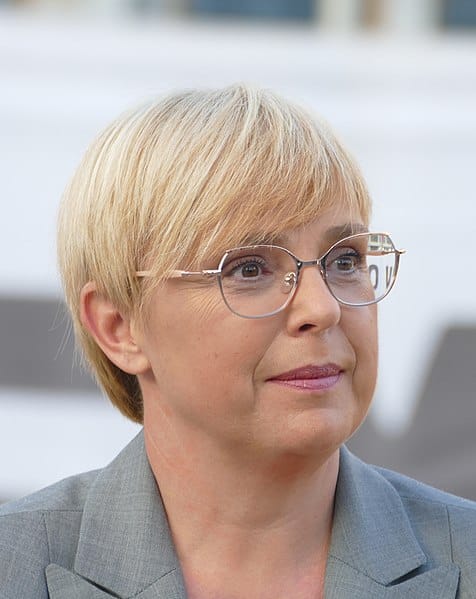Nataša Pirc Musar, 2022 (Wikimedia Commons)
After the first round on October 23 Nataša Pirc Musar and Anže Logar remained as candidates for the Slovenian presidency. The second round was held on November 13 – won by Pirc Musar, thereby becoming the first female president of Slovenia. It is simultaneously a symbolic victory over nationalism and right-wing populism in the Balkans.
Pirc Musar claims victory in second round after being a runner-up in the first round
In the second round of the presidential elections, roughly 898.000 people casted their votes on either independent candidate Nataša Pirc Musar or Anže Logar from the Slovenian Democratic Party (SDS). They were the only two candidates that advanced from the first round on October 23. Interestingly, Logar (33,95%) initially recorded a victory over Pirc Musar (26,88%) in this first round, in which 876.00 people voted on a total of 7 candidates. In the second round however, the tables turned and Pirc Musar (53,68%) won by a safe margin over Logar (46.14%).
The candidacy of Pirc Musar, despite being an independent, was supported by the Pirate Party of Slovenia and the Youth Party – European Greens. After Milan Brglez, candidate for the social democrats and supported by the Freedom Movement missed out on the presidency in the first round (15,45%), incumbent president Robert Golob (Freedom Movement) also announced his support for Pirc Musar. The eventual victory of Pirc Musar was widely anticipated pre-election, as Logar is associated with ousted controversial former prime minister Janez Janša, who is the leader of the SDS.
First female president of Slovenia
With her victory, Pirc Musar becomes the first female president of Slovenia, as well as commander-in-chief of the Slovenian Army. Additionally, she is responsible for appointing the head of the Central Bank of Slovenia. Although the Slovenian constitution declares the president to be the highest representative of the state, the position is commonly considered to be mostly ceremonial. She will take over this position from Borut Pahor, a former social democrat who was not eligible for re-election after holding the post for two consecutive five-year mandates.
Pirc Musar is a former presenter on Slovenia’s main news program and lawyer to Melania Trump, the former first lady of the United States of America who is of Slovenian origin. In her position as a lawyer, she was hired to protect the commercial interests of Melania Trump during her husband’s presidency. Pirc Musar, like her competitor Logar, did not stay free form criticism in the run-off to the election. She faced attacks over her husband’s lucrative business on the island of Jersey, known as a tax haven. Pirc Musar has always denied allegations that she was aware of her husbands business practices.
Breaking the chain
Several countries in the Balkans have seen the (re)emergence of nationalist parties in recent years, mostly with right-wing populist and Eurosceptic leanings. The victory of the independent Pirc Musar over the right-wing populist Logar may have little political value, but it can be seen symbolically as a victory over a party that undermines democracy and dialogue. It thus bears similarities to Bećirović’s symbolic victory over right-wing Izetbegović in October 2022 as Bosnian member of the presidency.
Moreover, Pirc Musar’s victory is a big symbolic step towards gender equality in Slovenia. Although Slovenia has made great progress in recent years in terms of equal rights and treatment of women, it is still below the measured average (68.6 out of 100) of the Gender Equality Index of the European Institute for Gender Equality (EIGE). Slovenia scores 67.5 in this ranking. Slovenia scores particularly low on women’s power, according to EIGE. Thus, the election of a woman to a position of power like the presidency seems at least a positive addition to improving the situation. Moreover, the last general election broke a record in terms of female representation in the Slovenian parliament: 36 out of 90 members were women. Urška Klakočar Zupančič also became the first woman ever to be elected president of the National Assembly.
They are signs of positive changes in Slovenia. A country that, with developments like the election of Pirc Musar, seems to be moving in a different direction from many other countries in the former Yugoslavia. The breakaway from populism and nationalism moves the country geopolitically even more towards the west, where the small Alpine country was already widely considered a frontrunner in the region. The trend that started with the victory of the green-liberal Golob over the populist Janša in the April 2023 parliamentary elections has thus also continued in the presidential elections.
Author: Mathieu Neelen
Sources: DeutscheWelle, EIGE1, EIGE2, Euractiv, Ingenere, LeMonde, Reuters1, Reuters2, TheGuardian
Photo: Wikimedia Commons



